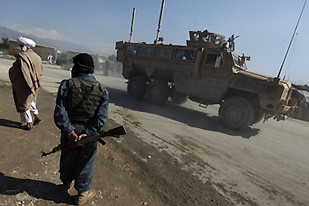
Bagram air base in Afghanistan was attacked by resistance forces on May 19, 2010. The U.S. imperialists and NATO have occupied the central Asian nation since 2001.Over 1,000 occupation troops have been killed., a photo by Pan-African News Wire File Photos on Flickr.
Afghan elders weigh in on security pact with U.S.
By Masoud Popolzai, Ben Brumfield and Greg Botelho, CNN
updated 1:39 AM EST, Thu November 21, 2013
STORY HIGHLIGHTS
100s of elders meet at the Loya Jirga to weigh in on important issues, like support of U.S. troops
Their decision is not binding, but Afghan President Karzai has said he will abide by it
John Kerry says "it's up to the people of Afghanistan" to approve the agreement
It says U.S. "forces shall not conduct combat operations in Afghanistan"
Kabul, Afghanistan (CNN) -- Before it is signed, the freshly minted security agreement between the United States and Afghanistan must face the scrutiny of the Afghan nation in Kabul starting Thursday.
Thousands of tribal elders, who have made their way to the capital, have kicked off the Loya Jirga, a grand assembly, to confer in the coming days on key issues. One of the biggest ones: Whether or not to support the presence in their country of a limited number of U.S. troops beyond next year, when Washington plans to end their combat mission.
"They have to pass it," said U.S. Secretary of State John Kerry, who announced Wednesday that he and Afghan President Hamid Karzai had arrived at the agreement.
"It's up to the people of Afghanistan," he said.
The Loya Jirga's decisions are not binding, but the opinions of its 2000-plus members are an important indicator of how the Afghan people feel. In the past, Karzai has said he respects the body and would acquiesce to its decision.
After the Loya Jirga
Once the elders have weighed in, Afghanistan's parliament will vote on the proposed bilateral agreement, and if it passes, send it to Karzai for signing.
Kerry and Karzai reached a deal on the final language of the security agreement, which guides the role of American troops in that south Asian nation for years to come, America's top diplomat said Wednesday.
If approved, the agreement would go into effect January 1, 2015, and last "until the end of 2024 and beyond, unless terminated" by mutual agreement and with two years notice by either party, according to a copy of the deal posted online Wednesday by the Afghan government that a U.S. official confirms is authentic.
U.S. forces will play a support role in Afghanistan, while at the same time ceding that "U.S. military operations to defeat al Qaeda and its affiliates may be appropriate in the common fight against terrorism."
"U.S. military counterterrorism operations are intended to complement and support (the Afghan military's) counterterrorism operations, with the goal of maintaining (the Afghan military's) lead and with full respect for Afghan sovereignty and full regard for the safety and security of the Afghan people, including in their homes," the tentative deal states.
The agreement also mentions U.S. government funding for Afghan security forces and give the U.S. military strict jurisdiction over alleged acts committed by U.S. soldiers on Afghan soil. On the other hand, Afghan authorities may request that anyone be removed from the country.
A sore spot
The subject of military raids and strikes has long been a sore point between the two countries, especially given a number of incidents in which noncombatant men, women and children were killed.
The proposed deal contains references to respecting "Afghanistan's sovereignty and territorial integrity," and adds U.S. forces "shall not target Afghan civilians, including in their homes."
But this agreement does not address past transgressions. In fact, Kerry strongly rejected a U.S. apology for operations that resulted in civilian casualties was part of the back-and-forth, as some published reports suggested, insisting "it's just not even on the table."
"I don't know where the idea of an apology started," Kerry said. "President Karzai didn't ask for an apology. ... There has never been a discussion of or the word apology used in our discussions whatsoever."
End of combat
U.S. troops first deployed to Afghanistan after the September 11, 2001, terror attacks, which were coordinated by al Qaeda leaders then based in the south Asian nation.
Since taking office, President Barack Obama has promised -- and, in some cases, acted -- to reduce troop levels there, in addition to stating the goal of ending the U.S. combat mission by the end of 2014.
The approval of a security agreement would pave the way for Americans troops to remain on the ground in Afghanistan beyond that.
Speaking on Wednesday, White House spokesman Jay Carney stressed that any U.S. forces would have "a very limited mission" and would not be "patrolling cities or mountains."
"The war in Afghanistan will end next year, as the president has promised," Carney said.
"The combat mission will be over."
Kerry used similar language in calling the U.S. military's role in Afghanistan "very limited," adding "it is entirely (to) train, equip and assist" Afghan forces.
The language in the proposed security agreement addresses that point directly: "Unless otherwise mutually agreed, the United States forces shall not conduct combat operations in Afghanistan."
No comments:
Post a Comment